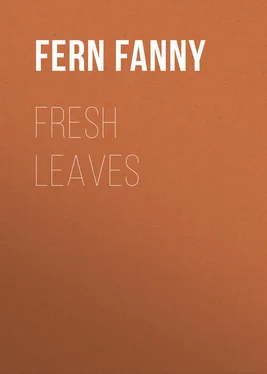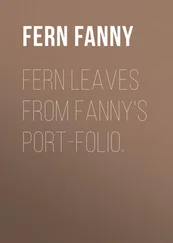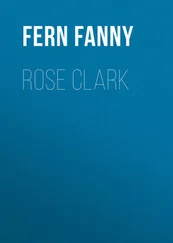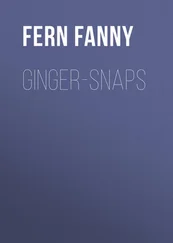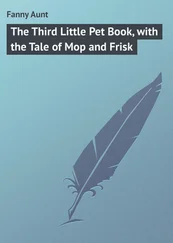Fanny Fern - Fresh Leaves
Здесь есть возможность читать онлайн «Fanny Fern - Fresh Leaves» — ознакомительный отрывок электронной книги совершенно бесплатно, а после прочтения отрывка купить полную версию. В некоторых случаях можно слушать аудио, скачать через торрент в формате fb2 и присутствует краткое содержание. Жанр: foreign_antique, foreign_prose, на английском языке. Описание произведения, (предисловие) а так же отзывы посетителей доступны на портале библиотеки ЛибКат.
- Название:Fresh Leaves
- Автор:
- Жанр:
- Год:неизвестен
- ISBN:нет данных
- Рейтинг книги:5 / 5. Голосов: 1
-
Избранное:Добавить в избранное
- Отзывы:
-
Ваша оценка:
- 100
- 1
- 2
- 3
- 4
- 5
Fresh Leaves: краткое содержание, описание и аннотация
Предлагаем к чтению аннотацию, описание, краткое содержание или предисловие (зависит от того, что написал сам автор книги «Fresh Leaves»). Если вы не нашли необходимую информацию о книге — напишите в комментариях, мы постараемся отыскать её.
Fresh Leaves — читать онлайн ознакомительный отрывок
Ниже представлен текст книги, разбитый по страницам. Система сохранения места последней прочитанной страницы, позволяет с удобством читать онлайн бесплатно книгу «Fresh Leaves», без необходимости каждый раз заново искать на чём Вы остановились. Поставьте закладку, и сможете в любой момент перейти на страницу, на которой закончили чтение.
Интервал:
Закладка:
Miss Alsop was an unmarried woman of forty, and presented that strange anomaly, a fat old maid. Her teeth were good, her hair thick and glossy, and her voice softer than the cooing of a dove; one of those voices which are the never-failing herald of deceit and hypocrisy to the keen observer of human nature. For years she had had her eye upon Mr. Alsop, and actually claimed a sort of cousinly relationship, which she never had been able very clearly to establish, but upon the strength of which she had come, self-invited, twice a month, to spend the day. The first moment Mrs. Wade saw her, she was conscious of an instinctive aversion to her; but as she was never in the habit of consulting her own tastes or inclinations, she endured the infliction with her own gentle sweetness. No one who witnessed her offering Miss Alsop the easiest chair, or helping her to the daintiest bit on the table, would have supposed that she read the wily woman’s secret heart. Not a look, not a word, not a tone betrayed it; but when the weary day was over, and Miss Alsop had exhausted all her vapid nothings, and, tying on her bonnet, regretted that she must trouble Mr. Wade to wait upon her home, Mrs. Wade, as they passed through the door, and out into the darkness, would lean her cheek upon her hand, while tears, which no human eye had ever seen, fell thick and fast.
Not that Mr. Wade had any affection for Miss Alsop – not at all – he was incapable of affection for any thing but himself and his money; but Miss Alsop had a way of saying little complimentary things to which the most sensible man alive never yet was insensible, from the stupidest and silliest of women. What wonder that the profound Mr. Wade walked into the trap with his betters? and though he would not, for one of his money-bags, have owned it, he always left her doubly impressed with the value of his own consequence. Then – Miss Alsop knew how to be an excellent listener when occasion required, and Mr. Wade was, like all egregious stupidities, fond of hearing himself talk; and occasionally Miss Alsop would ask him to repeat some remark he had made, as if peculiarly struck with its acuteness, or its adaptation to her single-blessed-needs, upon which Mr. Wade would afterward pleasantly reflect, with the mental exclamation, “Sensible woman, that Miss Alsop!” Let it not be supposed that this depth of cunning was at all incompatible with obtuseness of intellect – not at all – there is no cunning like the cunning of a fool. Yes – Miss Alsop knew her man. She knew she could afford to bide her time; besides, were personal charms insufficient, had she not a most potent auxiliary in her bank-book, which placed to her spinster credit twenty thousand dollars in the “People’s Bank?”
CHAPTER VI
Mrs. Wade sat propped up in bed by pillows, for the nature of her disease rendered repose impossible; dreadful spasms – the forerunners of dissolution – at intervals convulsed her frame. Pale, but firm, the gentle Mary Hereford glided about her, now supporting the worn-out frame – now holding to her lips the cup meant for healing – now opening a door, or slightly raising a window, to facilitate the invalid’s labored breathing.
The fire had burned low in the grate, and when the gray light of morning stole in through the half open shutter, and the invalid would have replenished it, Mrs. Wade’s low whispered, “I shall not need it, Mary,” gave expression to the fearful certainty which her own heart had silently throbbed out through the long watches of that agonized night. Not a murmur escaped the sufferer’s lips – there was no request for the presence of the absent sleeper, who had promised “to cherish through sickness and health;” no mention was made of the children, who had been trustingly placed in the hands of Him who doeth all things well, and who wearily slumbered on, unconscious that the brightness of their childhood’s sky was fading out forever. The thin arms were wound around the neck of the first-born, about whom such happy hopes had once so thickly clustered, and peacefully as an infant drops asleep. Susan Wade closed her eyes forever; so peacefully that the daughter knew not the moment in which the desolate word – “motherless” – was written over against her name.
Motherless! – that in that little word should be compressed such weary weight of woe! It were sad to be written fatherless – but God and his ministering angels only know how dark this earth may be, when she who was never weary of us with all our frailties – she, to whom our very weaknesses clamored more loudly for love, lies careless of our tears.
“Henry!” said Mr. Wade to Mr. Hereford, “I had no idea, in fact – I didn’t think” – and the embarrassed man tried to rub open his still sleepy eyes – “I didn’t suppose, really, that Mrs. Wade would die yet; women are so notional, and that doctor seemed to be encouraging Mrs. Wade to be sick, as doctors always do – really I am quite taken by surprise, as one may say; I don’t know any thing about these things – I should like to have you do what is necessary. I suppose it will not be considered the thing for me to go to the store to-day,” and he looked for encouragement to do so in the face of his disgusted son-in-law.
“I should think not, decidedly,” said Mr. Hereford, dryly.
“Of course it would not be my wish,” said Mr. Wade, “when poor Susan lies dead; but one’s duty, you know, sometimes runs a different way from one’s inclination.”
And vice versâ , thought Henry, but he merely remarked that he would take any message for him to his place of business.
Mr. Wade could do no less than accept his offer, so, after eating his usual breakfast with his usual appetite, he paced up and down the parlor; got up and sat down; and looked out at the window, and tried in various ways to stifle certain uncomfortable feelings which began to disturb his digestion. It was uncomfortable – very. The awe-struck face of Betty as she stole in and out, the swollen eyes of the children, the pallid face of Mrs. Hereford, who was trying to give them the consolation she so much needed herself, and the heavy step of the undertaker over-head performing his repulsive office. And so the day wore away; and the form, that a child might have lifted, was laid in the coffin, and no trace of pain or sorrow lay upon the face upon which the death-angel had written Peace!
Why did he fear to look upon its placid sweetness? No reproach ever came from the living lips – did he fear it from the dead?
How still lay the once busy fingers! What a mockery seemed the usual signs and sounds of domestic life! How empty, purposeless, aimless, seemed life’s petty cares and needs. How chilling this total eclipse of light, and love, and warmth! Blessed they, who can ease their pained hearts by sobbing all this out to the listening ear of sympathy. But what if the great agony be pent up within the swelling heart till it is nigh bursting? What if it be pent up thus in the gushing heart of childhood? What if no father’s arms be outstretched to enfold the motherless? What if the paternal hand never rests lovingly on the bowed young head? What if the moistening eye must send back to its source the welling tear? What if the choking sob be an offense? What if childhood’s ark of refuge – mother’s room – echo back only its own restless footsteps? O, how many houses that present only to the careless eye, a blank surface of brick and mortar, are inscribed all over with the handwriting, legible only to those whose baptism has been – tears!
But why count over the tears of the orphans, why tell of their weary days and sleepless nights – of honest Betty’s home-spun attempts at consolation – of Mr. Wade’s repeated refusals of Mrs. Hereford’s invitation for them to spend that part of the day with her in which he was absent at his business? Why tell of the invisible web the cunning Miss Alsop was weaving? Why tell of her speedy success? Why tell of the soft-eyed dove transformed by Hymen to the vulture? Why tell of his astonishment, who prided himself upon his lynx-eyed and infallible penetration of the sex, at being forced to drain to the dregs that bitter cup he had held so unsparingly to the meek lips upon which death had set his seal of silence? Why tell of that pitiful old age, which, having garnered the chaff, and thrown away the wheat of a life-time, finds itself on the grave’s brink with no desire for repentance, clutching with palsied hands the treasure of which Death stands ready to rob it!
Читать дальшеИнтервал:
Закладка:
Похожие книги на «Fresh Leaves»
Представляем Вашему вниманию похожие книги на «Fresh Leaves» списком для выбора. Мы отобрали схожую по названию и смыслу литературу в надежде предоставить читателям больше вариантов отыскать новые, интересные, ещё непрочитанные произведения.
Обсуждение, отзывы о книге «Fresh Leaves» и просто собственные мнения читателей. Оставьте ваши комментарии, напишите, что Вы думаете о произведении, его смысле или главных героях. Укажите что конкретно понравилось, а что нет, и почему Вы так считаете.
